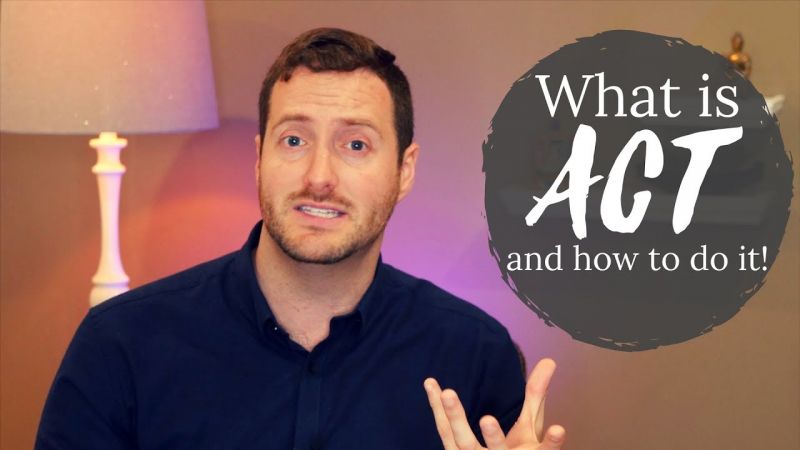¿Qué es ACT?
La terapia de aceptación y compromiso, o ACT, es un tipo de TCC que combina la aceptación y la práctica de concienciación para que los pacientes desarrollen patrones de pensamiento más flexibles. ACT no se trata de eliminar los pensamientos intrusos. Se trata de aprender a estar en paz con ellos y poner distancia entre su naturaleza y tu identidad. ACT es diferente al TCC tradicional porque no les enseña a las personas a reconocer sus pensamientos negativos y luego desarrollar estrategias par lidiar con ellos. En vez, ACT les enseña a reconocer los pensamientos negativos y aceptarlos tal y como son. Es esta aceptación que los modera y no los nuevos mecanismos de enfrentamiento desarrollados.
Hay 6 principios fundamentales de ACT:
- Defusión cognitiva: Aprender a darle menos importancia a los pensamientos negativos, imágenes y emociones.
- Aceptación: Permitir que los pensamientos fluyan a través de ti sin sentirte muy angustiado.
- Contacto con el presente: Enfocarte en tu estado actual en vez de preocuparte por el futuro o el pasado. Estar abierto a lo que sucede a tu alrededor.
- Observar el “yo”: Ser consciente de tu ser transcendente.
- Valores: Determinar qué es los más importante para ti, cuáles son los pilares en los que quieres vivir.
- Acción comprometida: Fijar objetivos basados en tus valores y en las cosas por las cuales te esmeras, y luego realizar estos logros.
Los críticos de ACT dicen que no debería ser considerada su propio tipo de terapia. En vez, debería funcionar como un componente de otras opciones de terapia más robustas.

What is Acceptance and Commitment Therapy (ACT)?
This brief introduction to Acceptance and Commitment Therapy takes you through the development history that underpins ACT.
So what exactly is ACT?
ACT, Acceptance and Commitment Therapy, is a type of therapy that combines acceptance and mindfulness practices together to help sufferers develop more flexible thinking patterns. ACT is not about eliminating intrusive thoughts. It is about learning to be at peace with them and distance their nature from your identity. ACT is different from traditional CBT because it does not teach people to recognize their negative thoughts and then develop strategies for dealing with them. Rather, ACT teaches peoples to recognize their negative thoughts and accept them for what they are.
ACT is all about giving up the need for control, learning to be more compassionate towards yourself and your thoughts, and shifting to a more flexible way of thinking. OCD is fueled by a desire for answers. ACT tells you to stop looking for those answers, and accept your reality as is. It’s all about….
Accepting your thoughts for what they are rather than analyzing them, disproving them or making them disappear entirely.
Committing to facing your fears rather than avoiding them. No more running away.
ACT was created by Dr. Steven Hayes in 1986. At that time, the accepted thinking in psychology was that bad thoughts should be deemed as such and rejected. People were encouraged to minimize and avoid pain, rather than understand it is a natural part of life. Dr. Hayes didn’t agree with that. He saw the harm in shunning aspects of life that are inevitable, and the value in letting go of control.
What are the pillars of ACT?
ACT has 6 core principles that arise throughout treatment. These aren’t introduced in order, but come and go depending on the need and problem at hand. They are:
Cognitive Defusion
Learning to assign less weight to negative thoughts, images and emotions.
Acceptance
Allowing thoughts to flow through you without feeling overly distressed.
Contact with the present moment
Focusing on your present state rather than worrying about the future or the past. Being open to the things going on around you.
Observing the self
Being conscious and aware of your transcendent self.
Values
Determining what is most important to you, what pillars you aim to live you life on.
Committed action
Setting goals based on your values and the things you are striving for, and then bringing these accomplishments to fruition.
Who is ACT for?
ACT is recommended for a wide range of people, not just OCD sufferers. People with PTSD, Panic Disorder, Phobias, substance abuse, at-risk youth and mood disorders may all be told to try ACT. When you think about it, it makes a lot of sense. The core of ACT — accepting your reality and your thoughts as they are — applies to a wide range of mental conditions and everyday scenarios. Most people can benefit from learning to approach life through an ACT lens.
That said, it might not always be the most effective option, like in the case of OCD. Many people believe that while much of what ACT teaches is beneficial, it’s lessons should be aspects of therapy, not an entire therapeutic practice. This is why ERP is the most trusted option for OCD. It takes the core principles of ACT, and combines them with another valuable exercise: confronting thoughts head on (aka exposures).
If you’re considering ACT, do research and consult with a few doctors in your area. It may also be beneficial to reach out to fellow sufferers and ask for their opinions. One place you can do so is on our Facebook Support Group that can be found here.
What should I expect from ACT?
Most effective OCD treatments require hard work and dedication. ACT is no exception. For it to work, you have to put time and energy into the process. That said, practitioners are normally understanding of how difficult therapy can be, and will start out slow and pick up speed over time.
As we’ve mentioned, ACT is different from traditional therapy because it focuses less on reducing symptoms and more on adapting to a mindful way of being. That’s not to say that ACT won’t minimize symptoms, it’s just not the immediate goal of therapy. ACT hopes to change the relationship that a sufferer has with their mind, body and condition, and in doing so, lessen the impact that OCD has on their life.
If you’re starting ACT therapy, here are a few things you can expect:
- Homework: You’ll be asked to fill out worksheets or practice techniques outside of therapy. Make sure to commit to these assignments. They are crucial to progress.
- Doubts: Many people spend their first few weeks, or even months, wondering how much of an impact their treatment is having. ACT takes time. You must be willing to be patient in order to see results.
- Discomfort: ACT may feel awkward at first. And that’s ok! It’s strange to adjust to new ways of thinking. Don’t beat yourself up for feeling off. It’s totally normal.
- Mindful Exercises: If you’re coming from more structured forms of therapy, this may be a big change for you. Since ACT is all about flexibility, acceptance and uncertainty, you’ll be asked to put those concepts into practice.
- Self-Reflection: As with most types of therapy, you’ll be asked to do a lot of observation and analysis into your own behaviors, desires, anxieties and characteristics.
- Optimism: Despite some of the doubts and discomforts that might come with starting ACT, it is still an extremely optimistic therapy. It preaches that even amidst pain, there is value and meaning to be found.
Is ACT hard?
Depends on who you are! No two journeys are the same. Every sufferer has their own opinion on the methods that work and don’t work for them. That said, no one should expect therapy to be easy. All options take time, energy and dedication. They require a real desire to get better. If you’re searching for a quick fix, you’re going to come up short.
If you’re feeling overwhelmed by your treatment journey, focus on the here and now. Therapy only needs to be as intimidating as your next session. Don’t think in terms of weeks, months and years. Think “I have X number of days until my next session, and X number of assignments to get done. That’s not so bad!”
From the Community
Are there more resources I can check out?
Of course! What we’ve provided is really only an intro to ACT. There is so much more to be explored if you are considering it as an option. Below you’ll find other sites, worksheets, videos and books that can help you better understand and practice ACT.
Webpages
- Acceptance And Commitment Therapy (ACT): The Psychology Of Acting Mindfully – Positive Psychology Program
- Acceptance and Commitment Therapy – Good Therapy
- Acceptance and Commitment Therapy – Wikipedia
- Acceptance & Commitment Therapy (ACT) – Association for Contextual Behavioral Science
Worksheets / Toolkits
- ACT Made Simple by Russ Harris, MD
- Getting Unstuck in ACT by Russ Harris, MD
- Worksheets, Handouts & Book Chapters from ACT Mindfully
Organizations
Books
- Acceptance and Commitment Therapy: An Experiential Approach to Behavior Change by Kelly G. Wilson, Kirk D. Strosahl and Steven C. Hayes
- Mindfulness and Psychotherapy, Second Edition by by Christopher Germer, Ronald D. Siegel and Paul R. Fulton
- Mindfulness and Acceptance: Expanding the Cognitive-Behavioral Tradition by Steven C. Hayes, Victoria M. Follette and Marsha M. Linehan
- A Practical Guide to Acceptance and Commitment Therapy by Steven C. Hayes and Kirk D. Strosahl
- Get Out of Your Mind and Into Your Life: The New Acceptance and Commitment Therapy by Steven C. Hayes
Apoya nuestro trabajo
Nuestra misión es cambiar la manera en que el mundo percibe la salud mental.




